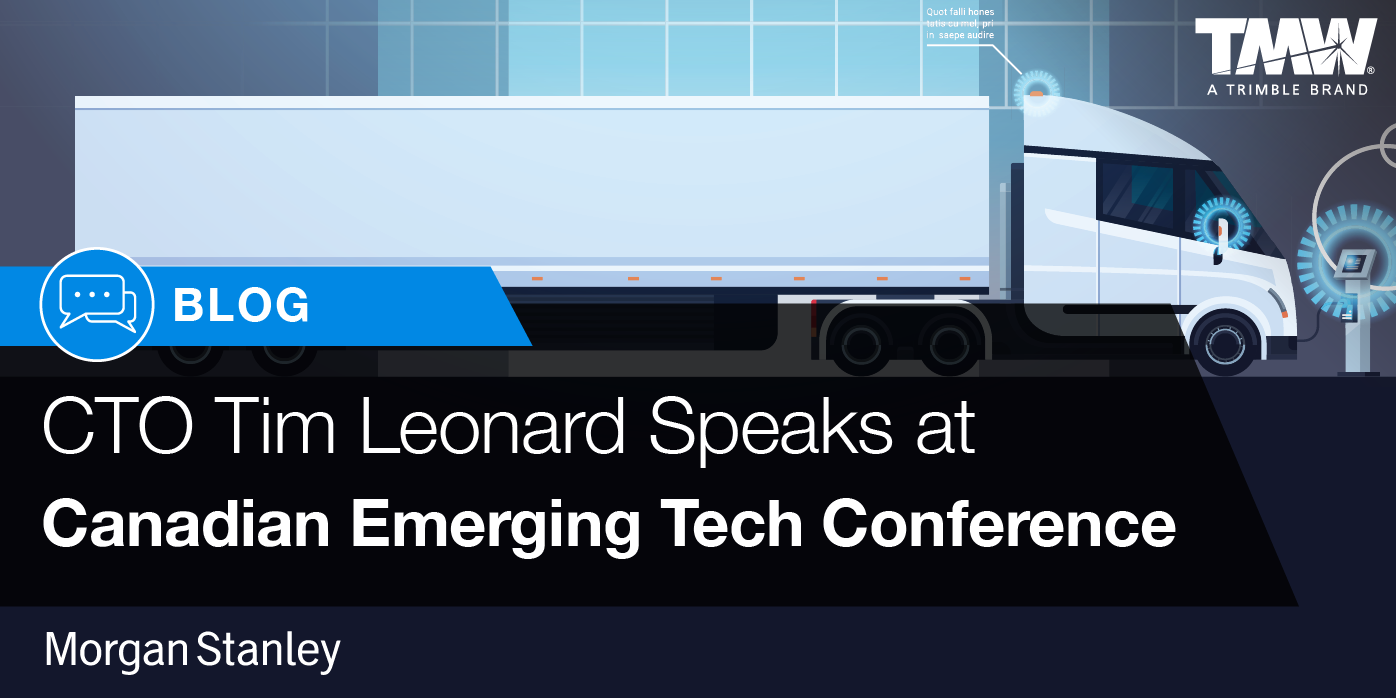
.jpg?width=182&name=Leonard_Tim_1090%20(2).jpg)
Trimble Transportation CTO Timothy Leonard recently joined a panel of leading technology companies to discuss the “Future of Transportation” at Morgan Stanley’s Canadian Emerging Tech Conference. Leonard was joined by Andrew Macdonald, vice president and regional general manager of Asia-Pacific at Uber, and Colin Sutherland, EVP of sales and marketing at Geotab, a telematics company.
The event, held in June 2018 at the MaRS Discovery District in Toronto, was exclusive to Morgan Stanley investors. But we have the highlights from Leonard’s Q&A session.
This Q&A is edited for length and clarity.
Question: How do you see the future of freight transportation evolving, and technology playing a bigger role in what has historically been a very traditional industry?
Answer: I certainly think the industry is under some constraint because there’s so much demand in the transportation and logistics industry. It’s just crazy right now how much freight there is to move, and of course, there are not enough people to move it. I don’t see the tonnage that is being transported going down that much anytime soon. So technology will have to play a huge role over the next 12 – 24 months to help deal with that demand.
The individuals that can disrupt the supply chain from end-to-end are going to have the biggest impact. Some of the bigger players like Amazon and Walmart are already doing that. Those are companies that exist up and down on the entire supply chain, from visibility to integration of systems. The reason I think that Amazon has been so lucrative is that they’re the only one that is trying to build a carrier base and network of small carriers. In that way, they could help facilitate the demand to help move the capacity. The challenge is, the bigger they get with freight, will they have the assets to move it?
Q: How do you get mom and pop shippers and carriers to embrace this?
A: Without the networks of small carriers working together, large carriers just outprice them on lanes and power lanes. So, how to entice the carriers is to facilitate a community-based type software that enables them to act as one network, a network where they can act as a unit or as community. And that’s where blockchain has come in. A community has better buying power than an individual. If your software is siloed just to handle one-offs, there’s not going to be a benefit. So small carriers using a collaborative community-based type software will need to work together. Again, that’s where the winning side will be.
Q: Given the historic inefficiencies and complexities in the system, the broker/agent model has grown powerful in this space. Do you see tech changing their role/viability?
A: It’s probably going to change the role itself. In today’s world, because there’s a lack of transparency, you have to insert somebody into that role. I think that the more that we build the technology that provides end-to-end transparency, the more we will have the ability to break up the components of shipments to do less hops. I don’t think that traditional broker/agent model will go away; I think it will take on new meaning. How that shakes up, I’m just not quite sure yet.
Q: What technologies are you most excited about?
A: I think it’s going to be a combination of technologies. I’m sorry, that’s an easy way out of answering the question. I think the understanding of how to utilize deeper analytics and operational pieces will help with the predictability and the simplifications of reporting. We’ve gotten so bulky with our ERP systems that the use of advanced analytics will enable us to have better check points in place.
As the blockchain matures – it’s not quite there, yet – hopefully the simplifications of both contracts and contracts that are embedded in the supply chain will enable better efficiencies. I think those are the things that will change transportation because there’s just such a lack of discipline in organization and productivity on the transportation side. The more that we can get into enabling blockchain to take care of work that’s being done in the ERP systems, I think the industry will see better relationships and more trust.
Q: How do you see the roles of tech players, tech giants and incumbents in a new tech transports world?
A: I think the ability for people to drill down into the technical aspect of technology is certainly going to be a necessity. But the problem still lies in the business application itself. It’s one thing to talk about the fundamental aspects of architect, design, developing and coding the types of open source software that you can use. But we still haven’t swung the pendulum on a good business design.
A developer should understand that if he’s modifying a feature that’s related to fuel costs, how does that affect the PAM (penetrable addressable market) and the TAM (total addressable market)? The tech players are still at a crossroads where they’re so heavily focused on technology that I don’t think that they know why they are creating the technology, or how to really implement it in real scenarios.
In my 30 years, we still have not crossed the bridge, but we will. That’s something that we need to continue working on. People don’t know why they’re coding things… to solve a problem? That mostly happens in the business. The marriage between technology and business has to become deeper; it has to become more integratable.


